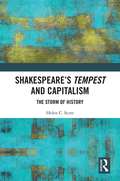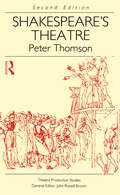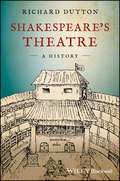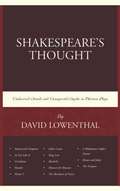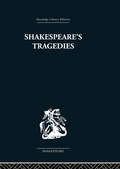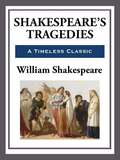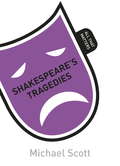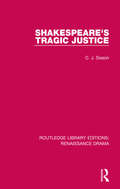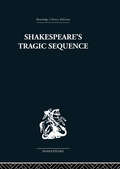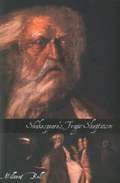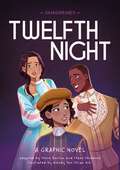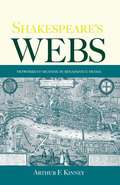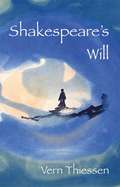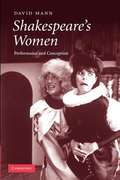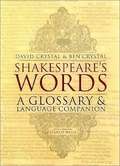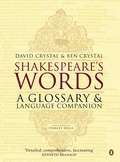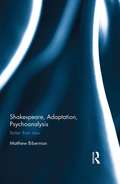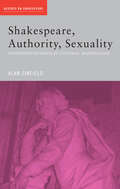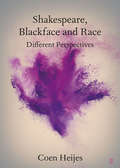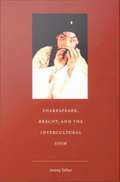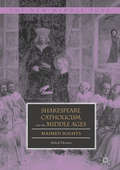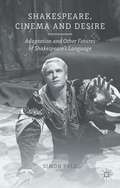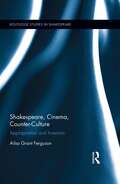- Table View
- List View
Shakespeare's Tempest and Capitalism: The Storm of History
by Helen C. ScottIn this forceful study, Helen C. Scott situates The Tempest within Marxist analyses of the ‘primitive accumulation’ of capital, which she suggests help explain the play’s continued and particular resonance. The ‘storm’ of the title refers both to Shakespeare’s Tempest hurtling through time, and to Walter Benjamin’s concept of history as a succession of violent catastrophes. Scott begins with an account of the global processes of dispossession—of the peasantry and indigenous populations—accompanying the emergence of capitalism, which generated new class relationships, new understandings of human subjectivity, and new forms of oppression around race, gender, and disability. Developing a detailed reading of the play at its moment of production in the business of theatre in 1611, Scott then moves gracefully through the global reception history, showing how its central thematic concerns and figurative patterns bespeak the upheavals and dispossessions of successive stages of capitalist development. Paying particular attention to moments of social crisis, and unearthing a radical political tradition, Scott follows the play from its hostile takeover in the Restoration, through its revival by the Romantics, and consolidation and contestation in the nineteenth century. In the twentieth century transatlantic modernism generated an acutely dystopic Tempest, then during the global transformations of the 1960s postcolonial writers permanently associated it with decolonization. At century’s end the play became a vehicle for exploring intersectional oppression, and the remarkable ‘Sycorax school’ featured iconoclastic readings by writers such as Abena Busia, May Joseph, and Sylvia Wynter. Turning to both popular culture and high-profile stage productions in the twenty-first century, Scott explores the ramifications and figurative potential of Shakespeare's Tempest for global social and ecological crises today. Sensitive to the play’s original concerns and informed by recent scholarship on performance and reception history as well as disability studies, Scott’s moving analysis impels readers towards a fresh understanding of sea-change and metamorphosis as potent symbols for the literal and figurative tempests of capitalism’s old age now threatening ‘the great globe itself.’
Shakespeare's Theatre (Theatre Production Studies)
by Peter ThomsonReviews of the First Edition `...valuable and enjoyable reading for all studying Shakespeare's plays.' Following in the patternestablished by John Russell Brown for the excellent series (Theatre and Production Studies), he provides first an account of Shakespeare's company, then a study of three individual plays Twelfth Night, Hamlet and Macbeth as performed by the company. Peter Thomson writes in a crisp, sharp, enlivening style.' TLS '`...the best analysis yet of Elizabethan acting practices, excavated form the texts themselves rather than reconstructed on basis of one monolithic theory, and an essay on Hamlet that is a model of Critical intelligence and theatrical invention.' Yearbook of English Studies `Synthesizes the important facts and summarizes projects with a vigorous prose style, and expertly applies his experience in both practical drama and academic teaching to his discussion.' Review of English Studies
Shakespeare's Theatre: A History
by Richard DuttonShakespeare’s Theatre: A History examines the theatre spaces used by William Shakespeare, and explores these spaces in relation to the social and political framework of the Elizabethan era. The text journeys from the performing spaces of the provincial inns, guild halls and houses of the gentry of the Bard’s early career, to the purpose-built outdoor playhouses of London, including the Globe, the Theatre, and the Curtain, and the royal courts of Elizabeth and James I. The author also discusses the players for whom Shakespeare wrote, and the positioning—or dispositioning—of audience members in relation to the stage. Widely and deeply researched, this fascinating volume is the first to draw on the most recent archaeological work on the remains of the Rose and the Globe, as well as continuing publications from the Records of Early English Drama project. The book also explores the contentious view that the ‘plot’ of The Seven Deadly Sins (part II), provides unprecedented insight into the working practices of Shakespeare’s company and includes a complete and modernized version of the ‘plot’. Throughout, the author relates the practicalities of early modern playing to the evolving systems of aristocratic patronage and royal licensing within which they developed Insightful and engaging, Shakespeare’s Theatre is ideal reading for undergraduates, postgraduates, and scholars of literature and theatre studies.
Shakespeare's Thought: Unobserved Details And Unsuspected Depths In Thirteen Plays
by David LowenthalApart from the dedicatory poem, this edition adds six new chapters to the original and sets forth under a new title that is a somewhat better guide to these pages than the old one (Shakespeare and the Good Life: Ethics and Politics in Dramatic Form). For attention to detail, I've been inspired by Thomas de Quincey's astonishing claim (in his "On the Knocking on the Door in Macbeth") that absolutely nothing in a Shakespearean play is there by accident.
Shakespeare's Tragedies
by G B HarrisonFirst published in 1951. G B Harrison here recognizes that Shakespeare's tragedies were intended for performance in a theatre and that the playwright's conspicuous gift among his contemporaries was a sympathy for joy and sorrow, pity and terror, and right and wrong of his people. The plays covered are: Titus Andronicus, Romeo and Juliet, Julius Caesar, Hamlet, Troilus and Cressida, Othello, King Lear, Macbeth, Antony and Cleopatra, Coriolanus and Timon of Athens.
Shakespeare's Tragedies
by William ShakespeareA collection containing Antony & Cleopatra, Coriolanus, Cymbeline, Julius Caesar, King Lear, Macbeth, Othello, Romeo and Juliet, The Life of Timon of Athens, The tragedy of Titus Andronicus, and The History of Troilus and Cressida.
Shakespeare's Tragedies: All That Matters (All That Matters)
by Michael ScottIn Shakespeare's Tragedies: All That Matters, Michael Scott explores and explains the secrets that have made Shakespeare's tragedies so enduring that they continue to be performed, watched and studied by millions of people every year. Professor Scott concentrates on the four great tragedies - Hamlet, King Lear, Othello and Macbeth - and builds an argument based around Shakespeare's use of language to prompt the audience's imagination and thought. This original little book, and its companion volume, Shakespeare's Comedies, will help you understand each of the plays in the context of its oeuvre and the changing concept of Shakespearean tragedy across the centuries.Appealing to both students and general readers, this book gives a fascinating introduction to Shakespeare's tragedies - and what matters most about them.
Shakespeare's Tragic Justice (Routledge Library Editions: Renaissance Drama)
by C. J. SissonThe problem of justice seems to have haunted Shakespeare as it haunted Renaissance Christendom. In this book, first published in 1963, four aspects of the problems of justice in action in Shakespeare’s great tragedies are explored. This study is based on the lifetime’s research of Elizabethan habits of mind by one of the most distinguished Shakespearean scholars, and will be of interest to students of English Literature, Drama and Performance.
Shakespeare's Tragic Sequence
by Kenneth MuirFirst published in 1972. The emphasis of this book is that each of Shakespeare's tragedies demanded its own individual form and that although certain themes run through most of the tragedies, nearly all critics refrain from the attempt to apply external rules to them. The plays are almost always concerned with one person; they end with the death of the hero; the suffering and calamity that befall him are exceptional; and the tragedies include the medieval idea of the reversal of fortune.
Shakespeare's Tragic Skepticism
by Millicent BellShakespeare's Tragic Skepticism has an ambitious aim. In writing it, I have tried to mark out a pathway across a trampled field, discussing plays more commented on over four centuries than anything else ever written except the Hebraic-Christian Bible.
Shakespeare's Twelfth Night: A Graphic Novel (Classics in Graphics #7)
by Steve Skidmore Steve BarlowShakespeare's Twelfth Night like you've never seen it - or read it - before! Classics in Graphics: Twelfth Night has been adapted into a graphic novel by expert authors, Steve Skidmore and Steve Barlow, with illustrations by Wendy Tan Shiau Wei. Experience the famous (and famously confusing) love triangle, presented with all the flair of your favourite rom-com.Classics in Graphics is a series of graphic novels for readers aged 10 plus that has inclusion at its heart, flinging wide the doors of literature for all to enter and understand. Including dyslexia-friendly design and encouraging readers to relate to iconic roles - casting spells, falling in love and winning duels. Each graphic novel includes pitch-perfect illustrations for depicting tragedy, romance, comedy or magic PLUS: - snappy simplified text presenting Shakespeare's themes clearly - introductory materials to help set the scene and context of each story - heaps of extra material at the back to keep the learning and fun going, including an exploration of themes in the play, the language, Shakespeare's inspirations, the publication and performance of the play in history, a timeline of Shakespeare's life and works, and much more! Plays available in the series include: Macbeth, The Tempest, Hamlet, Romeo and Juliet, A Midsummer Night's Dream, Much Ado About Nothing, Othello, Twelfth NightPraise for Classics in Graphics: "[...] an encouraging entry point to Shakespeare for my kids, and [...] an excellent job converting challenging language and literary themes to make it very inclusive, smoothing ease of understanding dialogue, plot, and narration without dumbing it down." - EricWilliamson, leagueofcomicgeeks.com
Shakespeare's Understanding of Honor (Studies in Statesmanship)
by John AlvisShakespeare's Understanding of Honor by John Alvis.
Shakespeare's Webs: Networks of Meaning in Renaissance Drama
by Arthur F. KinneyIn this book, renowned Renaissance drama critic Arthur F. Kinney argues that Shakespeare's method of composing plays through networks of meanings can be seen as a harbinger of today's information technology. Drawing upon hypertext and cognitive theory--areas that have for some time promised to take on more importance in the sphere of Shakespeare Studies--as well as the central metaphor of the Routledge collection The Renaissance Computer, Kinney looks in detail at four objects/images in Shakespeare's plays--mirrors, maps, clocks, and books--and explores the ways in which they make up networks of meaning within single plays and across the dramatist's body of work that anticipate in some ways the networks of meaning or "information" now possible in the computer age.
Shakespeare's Will
by Vern ThiessenAn exploration of one of the most silent characters in history: Anne Hathaway, the wife of William Shakespeare. The play sheds light on unexplored aspects of Hathaway's life by looking through the eyes and heart of the woman who spent a lifetime with—and without—the great poet. This work is the celebration of a life unbowed by tragedy and unapologetic in the face of public scorn.
Shakespeare's Women: Performance and Conception
by David MannDavid Mann examines the influence of the Elizabethan cross-dressed tradition on the performance and conception of Shakespeare's female roles through an analysis of all 205 extant plays written for the adult theater. The study provides both an historical context, showing how performance practice developed in the era before Shakespeare, and a comparative one, in revealing how dramatists in general treated their female characters and the influence their characterization had upon Shakespeare's writing. The book challenges many views of the sexual ethos of Elizabethan theater, offering instead a picture of Shakespeare which pays less attention to his supposed gender politics and more to his ability to exploit the cross-dressed convention as a dramatic medium. By challenging the gay and polemical feminist accounts that currently dominate the treatment of Elizabethan cross-dressing, the book restores its importance as a mainstream performance topic for academics and students.
Shakespeare's Words: A Glossary and Language Companion
by Stanley Wells David Crystal Ben CrystalA vital resource for scholars, students and actors, this book contains glosses and quotes for over 14,000 words that could be misunderstood by or are unknown to a modern audience. Displayed panels look at such areas of Shakespeare's language as greetings, swear-words and terms of address. Plot summaries are included for all Shakespeare's plays and on the facing page is a unique diagramatic representation of the relationships within each play.
Shakespeare's Words: A Glossary and Language Companion (Canto Classics Ser.)
by David Crystal Ben CrystalA vital resource for scholars, students and actors, this book contains glosses and quotes for over 14,000 words that could be misunderstood by or are unknown to a modern audience. Displayed panels look at such areas of Shakespeare's language as greetings, swear-words and terms of address. Plot summaries are included for all Shakespeare's plays and on the facing page is a unique diagramatic representation of the relationships within each play.
Shakespeare, Adaptation, Psychoanalysis: Better than New
by Matthew BibermanIn Shakespeare, Adaptation, Psychoanalysis, Matthew Biberman analyzes early adaptations of Shakespeare’s plays in order to identify and illustrate how both social mores and basic human psychology have changed in Anglo-American culture. Biberman contests the received wisdom that Shakespeare’s characters reflect essentially timeless truths about human nature. To the contrary, he points out that Shakespeare’s characters sometimes act and think in ways that have become either stigmatized or simply outmoded. Through his study of the adaptations, Biberman pinpoints aspects of Shakespeare’s thinking about behavior and psychology that no longer ring true because circumstances have changed so dramatically between his time and the time of the adaptation. He shows how the adaptors’ changes reveal key differences between Shakespeare’s culture and the culture that then supplanted it. These changes, once grasped, reveal retroactively some of the ways in which Shakespeare’s characters do not act and think as we might expect them to act and think. Thus Biberman counters Harold Bloom’s claim that Shakespeare fundamentally invents our sense of the human; rather, he argues, our sense of the human is equally bound up in the many ways that modern culture has come to resist or outright reject the behavior we see in Shakespeare’s plays. Ultimately, our current sense of 'the human' is bound up not with the adoption of Shakespeare’s psychology, perhaps, but its adaption-or, in psychoanalytic terms, its repression and replacement.
Shakespeare, Alchemy and the Creative Imagination
by Margaret HealyShakespeare's Sonnets and A Lover's Complaint constitute a rich tapestry of rhetorical play about Renaissance love in all its guises. A significant strand of this is spiritual alchemy: working the 'metal' of the mind through meditation on love, memory work and intense imagination. Healy demonstrates how this process of anguished soul work - construed as essential to inspired poetic making - is woven into these poems, accounting for their most enigmatic imagery and urgency of tone. The esoteric philosophy of late Renaissance Neoplatonic alchemy, which embraced bawdy sexual symbolism and was highly fashionable in European intellectual circles, facilitated Shakespeare's inscription of an interior drama of a desiring mind creating poetry. Arguing that Shakespeare's incorporation of alchemical textures throughout his late works is indicative of an artistic stance promoting religious toleration and unity, this book sets out a crucial new framework for interpreting the 1609 poems, and transforms our understanding of Shakespeare's art.
Shakespeare, Authority, Sexuality: Unfinished Business in Cultural Materialism (Accents on Shakespeare)
by Alan SinfieldShakespeare, Authority, Sexuality is a powerful reassessment of cultural materialism as a way of understanding textuality, history and culture, by one of the founding figures of this critical movement. Alan Sinfield examines cultural materialism both as a body of ongoing argument and as it informs particular works by Shakespeare and his contemporaries, especially in relation to sexuality in early-modern England and queer theory. The book has several interlocking preoccupations: theories of textuality and reading the political location of Shakespearean plays and the organisation of literary culture today the operation of state power in the early-modern period and the scope for dissidence the sex/gender system in that period and the application of queer theory in history. These preoccupations are explored in and around a range of works by Shakespeare and his contemporaries. Throughout the book Sinfield re-presents cultural materialism, framing it not as a set of propositions, as has often been done, but as a cluster of unresolved problems. His brilliant, lucid and committed readings demonstrate that the ‘unfinished business’ of cultural materialism - and Sinfield’s work in particular - will long continue to produce new questions and challenges for the fields of Shakespeare and Renaissance Studies.
Shakespeare, Blackface and Race: Different Perspectives (Elements in Shakespeare Performance)
by Coen HeijesThis Element addresses the topical debate on blackface, race and Othello. With Shakespeare performance studies being rather Anglo-centric, the author explores how this debate has taken a radically different course in the Netherlands, a country historically perceived as tolerant and culturally close to the UK. Through several case studies, including the Van Hove Othello of 2003/2012 and the latest, controversial 2018/2020 Othello, the first main house production with a black actor as Othello, the author analyses the interaction between blackface and (institutional) racism in Dutch society and theatre and how Othello has become an active player in this debate.
Shakespeare, Brecht, and the Intercultural Sign
by Antony TatlowIn Shakespeare, Brecht, and the Intercultural Sign renowned Brecht scholar Antony Tatlow uses drama to investigate cultural crossings and to show how intercultural readings or performances question the settled assumptions we bring to interpretations of familiar texts. Through a "textual anthropology" Tatlow examines the interplay between interpretations of Shakespeare and readings of Brecht, whose work he rereads in the light of theories of the social subject from Nietzsche to Derrida and in relation to East Asian culture, as well as practices within Chinese and Japanese theater that shape their versions of Shakespearean drama. Reflecting on how, why, and to what effect knowledges and styles of performance pollinate across cultures, Tatlow demonstrates that the employment of one culture's material in the context of another defamiliarizes the conventions of representation in an act that facilitates access to what previously had been culturally repressed. By reading the intercultural, Tatlow shows, we are able not only to historicize the effects of those repressions that create a social unconscious but also gain access to what might otherwise have remained invisible. This remarkable study will interest students of cultural interaction and aesthetics, as well as readers interested in theater, Shakespeare, Brecht, China, and Japan.
Shakespeare, Catholicism, and the Middle Ages: Maimed Rights (The New Middle Ages)
by Alfred ThomasWhereas traditional scholarship assumed that William Shakespeare used the medieval past as a negative foil to legitimate the present, Shakespeare, Catholicism, and the Middle Ages offers a revisionist perspective, arguing that the playwright valorizes the Middle Ages in order to critique the oppressive nature of the Tudor-Stuart state. In examining Shakespeare’s Richard II, The Merchant of Venice, Hamlet, King Lear, Macbeth, and The Winter’s Tale, the text explores how Shakespeare repossessed the medieval past to articulate political and religious dissent. By comparing these and other plays by Shakespeare’s contemporaries with their medieval analogues, Alfred Thomas argues that Shakespeare was an ecumenical writer concerned with promoting tolerance in a highly intolerant and partisan age.
Shakespeare, Cinema and Desire
by Simon RyleShakespeare, Cinema and Desire explores the desires and the futures of Shakespeare's language and cinematographic adaptations of Shakespeare. Tracing ways that film offers us a rich new understanding of Shakespeare, Simon Ryle highlights issues that are central to both Shakespeare and film: media technologies, narrative territories and flows, mourning and loss, the voice, the body, sexuality and gender. The recirculation of Shakespearean ideas in the critical theory of modernity, especially figures such as Jacques Lacan, Maurice Blanchot, Jacques Derrida, and Gilles Deleuze, parallels the negotiations of film adaptation. By focusing on the dialogue between Shakespeare and modernity, this study explores how Shakespeare film adaptation raises broad questions concerning the emancipatory potential of aesthetics. Shakespeare is the source of more movie screenplays than any other writer in history, and negotiations between Shakespeare and developing cinematic technologies have been influential across the history of cinema. This book contributes a much needed analysis of the relation of Shakespeare's language to film form, providing in-depth studies of major Shakespeare adaptations from directors such as Akira Kurosawa, Peter Greenaway, Joseph Mankiewicz, Grigori Kozintsev, Svend Gade, Jean-Luc Godard, and Laurence Olivier.
Shakespeare, Cinema, Counter-Culture: Appropriation and Inversion (Routledge Studies in Shakespeare #17)
by Ailsa Grant FergusonAddressing for the first time Shakespeare’s place in counter-cultural cinema, this book examines and theorizes counter-hegemonic, postmodern, and post-punk Shakespeare in late 20th and early 21st century film. Drawing on a diverse range of case studies, Grant Ferguson presents an interdisciplinary approach that offers new theories on the nature and application of Shakespearean appropriations in the light of postmodern modes of representation. The book considers the nature of the Shakespearean inter-text in subcultural political contexts concerning the politicized aesthetics of a Shakespearean ‘body in pieces,’ the carnivalesque, and notions of Shakespeare as counter-hegemonic weapon or source of empowerment. Representative films use Shakespeare (and his accompanying cultural capital) to challenge notions of capitalist globalization, dominant socio-cultural ideologies, and hegemonic modes of expression. In response to a post-modern culture saturated with logos and semiotic abbreviations, many such films play with the emblematic imagery and references of Shakespeare’s texts. These curious appropriations have much to reveal about the elusive nature of intertextuality in late postmodern culture and the battle for cultural ownership of Shakespeare. As there has yet to be a study that isolates and theorizes modes of Shakespearean production that specifically demonstrate resistance to the social, political, ideological, aesthetic, and cinematic norms of the Western world, this book expands the dialogue around such texts and interprets their patterns of appropriation, adaptation, and representation of Shakespeare.
